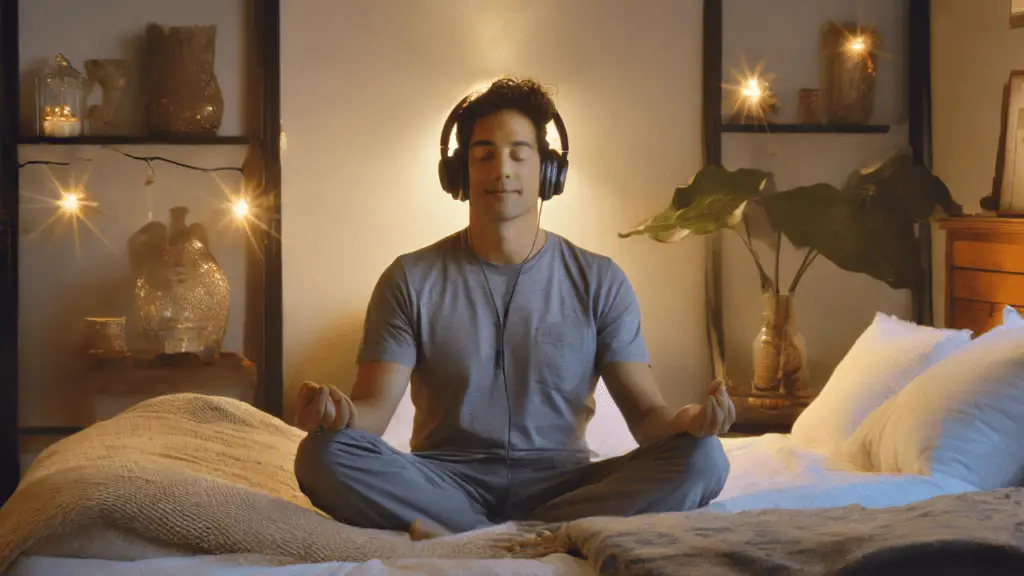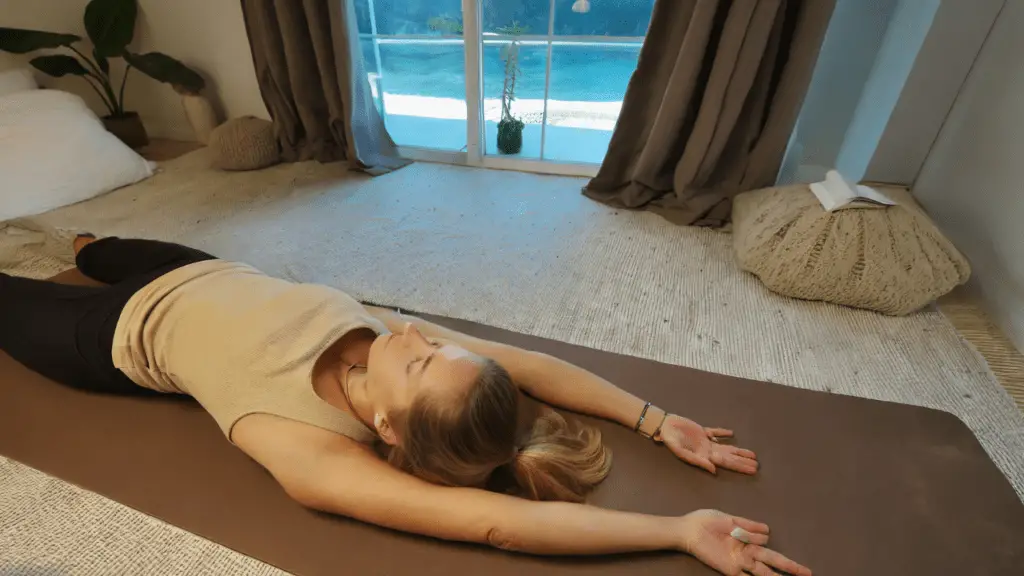Best Meditation for Deep Sleep and Relaxation
Struggling to fall asleep and find yourself tossing and turning? Do you feel your mind racing, unable to settle into a peaceful night’s rest? If so, you’re not alone. Millions of people worldwide grapple with sleep issues, often rooted in stress, anxiety, and an overactive mind. But fear not, there’s a simple yet powerful solution that can help you achieve the deep, restorative sleep you crave: meditation.
Meditation, an ancient practice rooted in mindfulness, offers a wealth of benefits for sleep and overall well-being. By calming your mind and body, meditation can help you unwind, reduce stress, and cultivate a sense of tranquility, paving the way for a peaceful slumber.
Key Takeaways:
- Meditation can help you achieve deep and restful sleep.
- There are several proven techniques to relax your mind and body before bedtime.
- Practicing meditation before sleep can have a profound impact on your sleep quality and overall well-being.
- Guided meditation is a powerful tool for achieving deep sleep.
- Creating a calming atmosphere before bed can enhance your meditation practice and promote relaxation.

Understanding the Benefits of Meditation for Sleep
Incorporating meditation into your bedtime routine has numerous benefits for your overall sleep patterns. Not only can it calm the mind and reduce stress and anxiety, but it can also improve the quality and duration of sleep.
One of the main benefits of meditation for sleep is its ability to activate the body’s natural relaxation response. This response helps reduce tension and promote feelings of calm and tranquility, allowing you to drift off into a restful slumber.
Mindfulness practices, such as meditation, have also been shown to decrease the time it takes to fall asleep and increase the overall amount of time spent asleep. This can lead to a more refreshed and energized feeling upon waking in the morning.
In addition, incorporating meditation into your bedtime routine can improve the overall quality of sleep. Studies have shown that mindfulness practices can increase the amount of deep sleep, also known as slow-wave sleep. This stage of sleep is crucial for physical restoration and growth, as well as memory consolidation and emotional regulation.
Overall, there are numerous benefits of incorporating meditation into your nighttime routine. From reducing stress and anxiety to improving sleep quality, mindfulness practices can positively impact your overall sleep patterns and contribute to a more restful and rejuvenating night’s sleep.
Guided Meditation for Better Sleep
If you struggle with getting a restful night’s sleep, guided meditation may be just what you need to help you achieve the deep and rejuvenating sleep you desire. Guided meditation is a simple and effective technique that can help you calm your mind, relax your body, and prepare for a peaceful slumber.
During guided meditation, you listen to a trained practitioner who will guide you through the meditation process, providing instructions on breathing, visualization, and relaxation techniques. This can be particularly helpful for those who struggle with racing thoughts or find it difficult to quiet their minds before bed.
The Benefits of Guided Meditation for Better Sleep
Guided meditation offers a multitude of benefits for improving the quality of your sleep. Here are just a few:
- Reduced Stress: By focusing on your breath and releasing tension in your body, guided meditation can help reduce stress, one of the primary causes of sleep disturbance.
- Improved Sleep Quality: With regular practice, guided meditation can help improve the overall quality of your sleep, allowing you to wake up feeling more refreshed and energized.
- Enhanced Relaxation: Guided meditation helps you enter a state of deep relaxation, which can help you fall asleep more quickly and stay asleep longer.

Getting Started with Guided Meditation for Better Sleep
If you are new to guided meditation, there are many resources available to help you get started. You can find guided meditation videos online or download guided meditation apps on your phone. You may also consider seeking guidance from a meditation instructor or attending a meditation class.
| Tip: | Choose a guided meditation that focuses on relaxation and deep breathing techniques. This will help calm your mind and prepare your body for sleep. |
|---|
Incorporating guided meditation into your bedtime routine can take some practice, but with persistence and patience, it can become a powerful tool for improving the quality of your sleep. So why not give it a try and start experiencing the benefits of guided meditation for better sleep today?
Meditation Techniques for Better Sleep
In this section, we will explore a variety of meditation techniques specifically designed to promote better sleep. These techniques can help you relax your mind and body, allowing you to drift into a state of tranquility for a more restful sleep experience.
1. Focused Breathing Exercises
One of the simplest and most effective meditation techniques for better sleep is focused breathing exercises. This involves taking slow, deep breaths and focusing all of your attention on the sensation of the air moving in and out of your body. By concentrating solely on your breath, you can quiet your mind and release the stress and tension of the day.
2. Body Scan Meditations
Another effective technique is the body scan meditation. This involves lying down comfortably and systematically focusing your attention on each part of your body, from your toes to the top of your head. By doing so, you can release any physical tension and become more aware of your body, helping you to relax more deeply and fall asleep more easily.
3. Visualization Meditations
Visualization meditations can also be helpful in promoting better sleep. This technique involves visualizing a peaceful scene or activity to help you relax and calm your mind. For example, you might imagine yourself lying on a beach, feeling the warmth of the sun on your skin and listening to the sound of the waves. By creating a mental image of relaxation, you can enhance your feelings of calmness and ease.

4. Loving-Kindness Meditations
Loving-kindness meditations involve focusing on positive emotions, such as gratitude, kindness, and compassion. This technique can help you release negative thoughts and feelings, allowing you to feel more peaceful and relaxed. By cultivating feelings of love and appreciation, you can create a positive mindset that can help you fall asleep more easily.
5. Progressive Muscle Relaxation
Progressive muscle relaxation is a technique that involves tensing and then releasing each muscle group in your body, starting with your feet and working your way up to your head. By doing so, you can release physical tension and promote relaxation throughout your body.
6. Mindfulness Meditation
Mindfulness meditation involves focusing your attention on the present moment, without judgment or distraction. By observing your thoughts and feelings without reacting to them, you can develop a greater sense of inner peace and balance. This technique can be particularly helpful for reducing stress and anxiety, which can interfere with sleep.
By incorporating these meditation techniques into your nighttime routine, you can promote better sleep and wake up feeling more rested and refreshed. Experiment with different techniques to find the ones that work best for you, and make them a regular part of your sleep routine.
Deep Sleep Meditation: Unleashing the Benefits
When it comes to achieving a restful and rejuvenating sleep, deep sleep meditation can be a game-changer. This technique allows us to tap into the powerful benefits of meditation while targeting the specific goal of achieving deep, restorative sleep.
So what exactly is deep sleep meditation? Simply put, it involves practicing meditation techniques designed to promote relaxation and calmness in the body and mind, ultimately leading to a state of deep sleep. This practice is especially beneficial for those who struggle with insomnia or who have trouble achieving restful sleep.
Deep sleep meditation offers a range of benefits that can positively impact both our physical and mental health. Some of the key benefits of incorporating this practice into your bedtime routine include:
| Benefit | Description |
|---|---|
| Improved sleep quality | By training our minds to relax and let go of stress and anxiety, we can access deeper levels of sleep, leading to a more restful and rejuvenating experience. |
| Reduced stress and anxiety | Deep sleep meditation promotes a state of relaxation and calmness, allowing us to let go of stress and anxiety that can keep us up at night. |
| Enhanced mental clarity | By achieving deeper levels of sleep, we allow our brains to undergo the necessary processes for mental restoration and clarity. |
| Increased energy and vitality | A restful night’s sleep is essential for boosting energy levels and feeling vibrant and alive throughout the day. |
There are a variety of techniques that can be used to practice deep sleep meditation, including body scan meditations, visualization exercises, and breathing techniques. By experimenting with different techniques and finding the ones that work best for you, you can unlock the full potential of this powerful practice.
Overall, incorporating deep sleep meditation into your bedtime routine can have a profound impact on your overall well-being. By promoting relaxation, reducing stress and anxiety, and allowing for deeper levels of sleep, this technique can help us wake up feeling refreshed, energized, and ready to take on the day.
Calming Meditation Before Bedtime: Setting the Stage for Restful Sleep
Are you feeling restless and having trouble sleeping at night? Perhaps incorporating calming meditation before bedtime can help. By setting the stage for restful sleep, you can attain a significant improvement in your sleep quality and overall well-being.
Before diving into the benefits of calming meditation, let’s first explore what it is. Calming meditation involves focusing your mind on a peaceful and relaxing image or sound, allowing your body and mind to enter a state of tranquility. This state helps ease anxiety and reduce stress, which are often the main culprits causing restlessness and poor sleep quality.
The benefits of calming meditation before bedtime go beyond just providing restful sleep. It can also increase your overall sense of well-being and positivity. By reducing stress and anxiety, calming meditation can lower cortisol levels in the body, leading to reduced inflammation and an increase in immune function. Additionally, practicing calming meditation regularly can help improve cognitive function, memory, and mental clarity.
“By reducing stress and anxiety, calming meditation can lower cortisol levels in the body, leading to reduced inflammation and an increase in immune function.”
So how can you incorporate calming meditation into your bedtime routine? Here are some techniques:
| Technique | Description |
|---|---|
| Guided Meditation | Listen to a guided meditation session that guides you through visualization and helps you relax your body and mind. |
| Deep Breathing | Concentrate on your breath, taking long deep breaths and exhaling slowly. This technique helps slow down your heart rate and relax your muscles. |
| Body Scan Meditation | Start by focusing on your toes and slowly move your attention up to the crown of your head, paying attention to each part of your body. This technique helps reduce muscle tension and ease anxiety. |
Creating a peaceful atmosphere is also vital in setting the stage for calming meditation. Dimming lights, playing soft music or nature sounds, and lighting candles can help create a soothing environment. Additionally, avoiding screens and technology before bed can help eliminate distractions and prepare your mind and body for a peaceful slumber.
Incorporating calming meditation into your bedtime routine can help you achieve restful sleep and improve your overall well-being. So why not try it tonight and see how it works for you?

Overcoming Insomnia with Meditation
If you struggle with insomnia, you know how frustrating it can be to lay awake for hours on end, unable to fall asleep. Fortunately, meditation can be a powerful tool in helping you overcome insomnia and achieve restful sleep.
Meditation for insomnia involves techniques that help calm the mind and release any stress or anxiety that may be preventing you from sleeping. By practicing these techniques regularly, you can create a sense of inner peace and relaxation that can help you fall asleep faster and stay asleep longer.
“Meditation is not a way of making your mind quiet. It’s a way of entering into the quiet that’s already there – buried under the 50,000 thoughts the average person thinks every day.” – Deepak Chopra
Insomnia Meditation Techniques
There are many different meditation techniques that can help you overcome insomnia. Here are some to try:
- Deep breathing: Take slow, deep breaths and focus your attention on your breath. When your mind starts to wander, gently bring your focus back to your breath.
- Body scan: Lie down comfortably and focus your attention on each part of your body, starting at your toes and working your way up to your head. Pay attention to any sensations you feel in each body part.
- Visualization: Imagine a peaceful scene, such as a beach or a forest. Use your senses to fully immerse yourself in the visualization and calm your mind.
Creating the Ideal Sleep Environment
In addition to meditation techniques, creating the right sleep environment can also be helpful in overcoming insomnia. Ensure your bedroom is cool, dark, and quiet, and avoid using electronic devices before bedtime. Incorporate calming scents, such as lavender, into your environment to create a relaxing atmosphere.
By incorporating meditation techniques and optimizing your sleep environment, you can overcome insomnia and achieve deep, restful sleep. Remember, it’s important to be patient and consistent in your practice – the benefits of meditation take time to fully manifest.
Deep Sleep Relaxation Techniques: Enhancing Your Sleep Environment
Creating a relaxing sleep environment is key to achieving deep and restful sleep. By optimizing your surroundings, you can minimize distractions and promote calmness, helping your body and mind prepare for a rejuvenating slumber.
Relaxation techniques for quality sleep
One effective way to enhance your sleep environment is by incorporating relaxation techniques into your bedtime routine. These techniques can help calm your mind and body, reducing stress and anxiety and allowing you to enter a state of deep relaxation.
“Relaxation means releasing all concern and tension and letting the natural order of life flow through one’s being.” – Donald Curtis
To promote relaxation, consider practicing deep breathing exercises, progressive muscle relaxation, or guided meditation. These techniques can help ease tension in your body and quiet your mind, creating a peaceful environment conducive to restful sleep.
Deep sleep relaxation techniques
In addition to relaxation exercises, there are several environmental factors that can enhance the quality of your sleep. Creating a dark, quiet, and cool sleeping environment can help your body and mind relax and prepare for deep sleep. Here are a few tips to help you optimize your sleep environment:
| Tip | Description |
|---|---|
| Use blackout curtains | Eliminate external light sources that can interfere with your sleep |
| Minimize noise | Reduce ambient noise by wearing earplugs or using a white noise machine |
| Adjust the temperature | Keep your bedroom cool and comfortable for more restful sleep |
| Avoid electronics | Avoid using electronic devices in bed, as the blue light emitted can interfere with your natural sleep cycle |
By incorporating these relaxation techniques and optimizing your sleep environment, you can promote deep and restful sleep, setting yourself up for a more energized and productive day.
Conclusion
In conclusion, incorporating meditation into your bedtime routine can have a significant impact on your sleep quality and overall well-being. By practicing meditation techniques such as guided meditation, deep sleep meditation, and calming meditation before bedtime, you can achieve a more relaxed state of mind and body, leading to a deeper and more rejuvenating sleep.
Furthermore, meditation can be a powerful tool in overcoming insomnia and reducing stress and anxiety, which are often the root causes of sleep-related issues. By creating a peaceful sleep environment and optimizing your surroundings for relaxation, you can enhance your sleep experience even further.
We encourage you to experiment with different meditation techniques and find what works best for you. With time and practice, you can develop a personalized routine that will help you achieve deep, restful sleep and wake up feeling refreshed and ready to take on the day.
FAQ
1. What is the best meditation for deep sleep and relaxation?
The best meditation for deep sleep and relaxation varies from person to person. Some popular techniques include mindfulness meditation, body scan meditation, and loving-kindness meditation. It’s important to find a technique that resonates with you and helps you achieve a state of tranquility before sleep.
2. What are the benefits of meditation for sleep?
Meditation has numerous benefits for sleep. It can help reduce stress and anxiety, improve sleep quality, and promote relaxation. Regular meditation practice can also enhance overall sleep patterns and lead to better physical and mental well-being.
3. What are some meditation techniques for better sleep?
Guided meditation is a technique where a voice or audio recording guides you through the meditation process. It can be particularly helpful for sleep as it helps calm the mind, relax the body, and provide a focus for your attention. Guided meditation can guide you into a peaceful slumber and enhance your overall sleep experience.
4. How does guided meditation help with sleep?
Guided meditation is a technique where a voice or audio recording guides you through the meditation process. It can be particularly helpful for sleep as it helps calm the mind, relax the body, and provide a focus for your attention. Guided meditation can guide you into a peaceful slumber and enhance your overall sleep experience.
5. What are some meditation techniques for better sleep?
There are various meditation techniques that can promote better sleep. Some examples include focused breathing exercises, body scan meditations, and visualization techniques. These practices can help quiet the mind, relax the body, and prepare you for a restful night’s sleep.
6. What are the benefits of deep sleep meditation?
Deep sleep meditation can enhance the quality and duration of your sleep. It promotes a state of deep relaxation, allowing your body to experience the restorative benefits of sleep. Deep sleep meditation can lead to improved physical and mental well-being, increased energy levels, and better overall sleep patterns.
7. How can calming meditation before bedtime help with sleep?
Calming meditation before bedtime helps set the stage for restful sleep. It creates a peaceful atmosphere, reduces stress and anxiety, and prepares your mind and body for sleep. Incorporating calming meditation into your nightly ritual can promote relaxation and help you achieve a more restful and rejuvenating sleep.
8. Can meditation help with insomnia?
Yes, meditation can be a powerful tool in overcoming insomnia. It can soothe anxiety, calm the mind, and create the ideal conditions for sleep. By incorporating meditation into your bedtime routine, you can alleviate insomnia symptoms and improve the quality of your sleep.
9. What are some deep sleep relaxation techniques?
Deep sleep relaxation techniques can enhance your sleep environment and promote a more restful sleep. Some examples include creating a soothing ambiance in your bedroom, practicing relaxation exercises such as progressive muscle relaxation, and using calming scents or sounds. These techniques can help you unwind before bed and create the perfect conditions for deep sleep.
10. Why is meditation important for better sleep?
Meditation is important for better sleep because it helps calm the mind, relax the body, and reduce stress and anxiety. By incorporating meditation into your nightly routine, you can create a sense of peace and tranquility that prepares you for a restful night’s sleep. Regular meditation practice can also improve sleep quality and overall well-being.